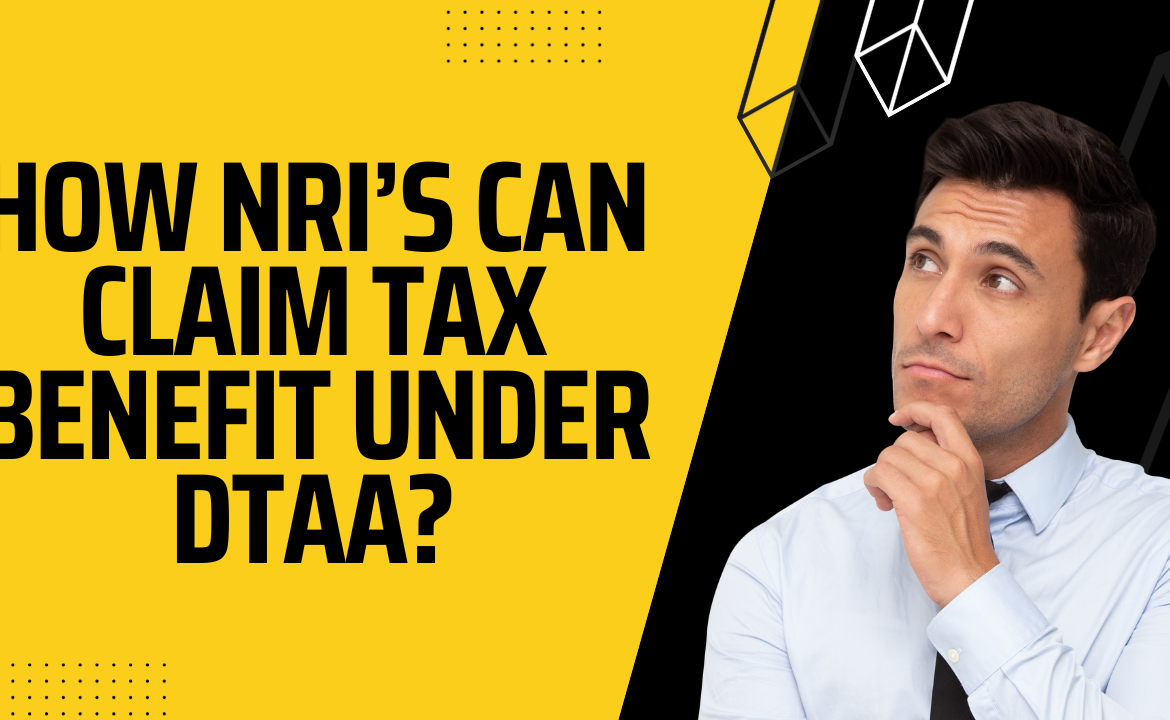Non-Resident Indians (NRIs) can avail tax benefits under the Double Taxation Avoidance Agreement (DTAA), a bilateral agreement between two countries to prevent the taxation of the same income in both jurisdictions. Understanding the provisions of DTAA is essential for NRIs to optimize their tax liabilities and prevent double taxation on their income. In this article, we explore how NRIs can claim tax benefits under DTAA, examining the key provisions, eligibility criteria, and the procedural steps involved. By leveraging the benefits provided by DTAA, NRIs can ensure tax efficiency and compliance with the tax regulations of both their home country and the country where they earn income.
Introduction to DTAA for NRIs
For Non-Resident Indians (NRIs), navigating the complex landscape of international taxation is a critical aspect of financial planning. The Double Taxation Avoidance Agreement (DTAA) emerges as a key instrument, providing a framework to prevent the taxing of the same income in both the home country and the country where income is earned. This bilateral agreement aims to eliminate the burden of double taxation, ensuring that NRIs can optimize their tax liabilities and foster cross-border economic activities.
Under DTAA, specific provisions govern the taxation of various types of income, including salary, business profits, and capital gains. Understanding the residency rules, eligibility criteria, and procedural steps for claiming tax benefits is paramount for NRIs seeking to efficiently manage their tax obligations. This article delves into the intricacies of how NRIs can leverage DTAA to their advantage, exploring the key provisions, eligibility criteria, procedural steps, and real-life case studies. By unraveling the complexities of DTAA, NRIs can harness the benefits offered by this agreement, promoting tax efficiency, and ensuring compliance with the tax regulations of both their home country and the country where they derive income.
Key Provisions of DTAA for NRIs
The Double Taxation Avoidance Agreement (DTAA) for Non-Resident Indians (NRIs) encompasses crucial provisions that shape the taxation landscape for individuals earning income in multiple jurisdictions. Residency rules serve as a cornerstone, defining the tax obligations based on the individual’s residential status. DTAA also outlines the types of income covered, including salary, business profits, dividends, and capital gains, providing clarity on how each category is to be taxed in the respective countries.
One of the significant aspects of DTAA is the establishment of taxation rates and exemptions. The agreement typically prescribes specific rates for various types of income, often at reduced rates compared to the standard tax rates. Additionally, DTAA may offer exemptions or credits to prevent the same income from being taxed twice. These provisions play a pivotal role in mitigating the impact of double taxation, promoting fair and efficient tax treatment for NRIs.
Eligibility Criteria for NRI Tax Benefits
The eligibility criteria for Non-Resident Indians (NRIs) to avail tax benefits under the Double Taxation Avoidance Agreement (DTAA) involve determining their residential status, the source of income, and compliance with specific conditions outlined in the agreement.
- Determining Residential Status:
- NRIs must ascertain their residential status as per the tax laws of both their home country and the country where they earn income. The criteria often consider the duration of stay, ties to the home country, and the primary place of residence.
- Source of Income:
- Eligibility for tax benefits under DTAA is contingent on the source of income. NRIs should identify the nature of their earnings, whether it be from employment, business, investments, or other sources, and understand how DTAA applies to each category.
- Compliance with DTAA Conditions:
- NRIs must adhere to the specific conditions outlined in the DTAA between their home country and the country of income. This may include obtaining a Tax Residency Certificate, filing tax returns in both jurisdictions, and ensuring that their actions align with the provisions of the agreement.
Procedural Steps to Claim Tax Benefits
Claiming tax benefits under the Double Taxation Avoidance Agreement (DTAA) involves several procedural steps for Non-Resident Indians (NRIs) seeking to optimize their tax liabilities:
- NRIs should secure a Tax Residency Certificate (TRC) from the tax authorities in their home country. This certificate serves as evidence of their tax residency status and is often a prerequisite for availing benefits under DTAA.
- NRIs must fulfill their tax obligations by filing returns in both their home country and the country where they earn income. Accurate reporting ensures compliance with the provisions of DTAA.
- NRIs can claim tax credits or exemptions based on the provisions outlined in DTAA. Understanding the specific rules related to different types of income is crucial to optimizing tax benefits.
- NRIs should maintain thorough documentation, including proof of residential status, income sources, and compliance with DTAA conditions. This documentation serves as crucial evidence during tax assessments.
Common Challenges and Solutions
Non-Resident Indians (NRIs) may encounter various challenges when attempting to claim tax benefits under the Double Taxation Avoidance Agreement (DTAA). Addressing these challenges is crucial for optimizing tax positions and ensuring compliance.
- Dual Residency Issues:
- Challenge: Determining tax residency can be complex when an individual qualifies as a tax resident in both the home country and the country of income.
- Solution: Seeking professional advice and carefully examining the tie-breaker rules in the DTAA can help resolve dual residency issues.
- Tax Disputes and Audits:
- Challenge: NRIs may face audits or disputes regarding their tax filings, requiring careful documentation to support their claims.
- Solution: Maintaining thorough records, including the Tax Residency Certificate, and engaging tax professionals can aid in addressing disputes and audits effectively.
- Interpreting DTAA Provisions:
- Challenge: Understanding the nuanced provisions of DTAA can be challenging for NRIs, potentially leading to misinterpretation.
- Solution: Seeking guidance from tax experts who specialize in international taxation ensures accurate interpretation and application of DTAA provisions.
- Changes in DTAA Agreements:
- Challenge: Amendments to DTAA agreements may impact tax benefits, requiring NRIs to stay informed about evolving regulations.
- Solution: Regularly monitoring updates, staying informed about changes, and adapting tax strategies accordingly can mitigate the impact of amendments.
FAQs on NRI Tax Benefits under DTAA
- Q: What is DTAA, and how does it benefit NRIs?
- A: DTAA is a bilateral agreement between two countries to avoid double taxation. For NRIs, it prevents the same income from being taxed in both their home country and the country where they earn income, offering tax relief.
- Q: How does one determine tax residency as an NRI?
- A: Tax residency is determined based on factors like the duration of stay, ties to the home country, and primary place of residence. Understanding the residency rules is crucial for claiming tax benefits under DTAA.
- Q: Is obtaining a Tax Residency Certificate (TRC) necessary?
- A: Yes, a TRC serves as evidence of tax residency and is often required to avail of benefits under DTAA. NRIs should obtain this certificate from the tax authorities in their home country.
- Q: Can NRIs claim tax credits or exemptions under DTAA?
- A: Yes, NRIs can claim tax credits or exemptions based on the specific provisions outlined in DTAA. Understanding the rules for different types of income is essential for optimizing tax benefits.
- Q: How can NRIs resolve dual residency issues?
- A: NRIs facing dual residency challenges can rely on the tie-breaker rules in DTAA. Seeking professional advice is recommended to navigate this complex situation effectively.
- Q: Are changes in DTAA agreements common, and how should NRIs stay informed?
- A: Yes, changes in DTAA agreements occur. NRIs should stay informed about updates, regularly monitor changes, and adapt their tax strategies accordingly to mitigate the impact of amendments.
Conclusion
In conclusion, understanding and leveraging the provisions of the Double Taxation Avoidance Agreement (DTAA) is essential for Non-Resident Indians (NRIs) to optimize their tax positions and ensure compliance. Navigating the complexities of international taxation requires careful consideration of residency rules, eligibility criteria, and procedural steps. By addressing common challenges, staying informed about changes, and seeking professional guidance, NRIs can confidently claim tax benefits under DTAA. This empowers them to manage their cross-border financial activities efficiently, prevent double taxation. And also foster a tax-efficient framework that aligns with the evolving landscape of international tax regulations.
Also Read:

Hello, I am Tanisha Kriplani, graduated in computer science from Delhi University. I am passionate about web content writing and have a strong interest in Data Analytics and Data Engineering.











